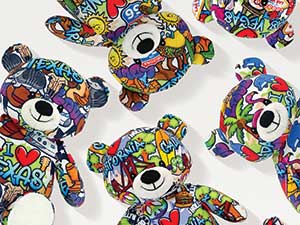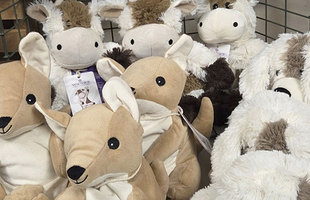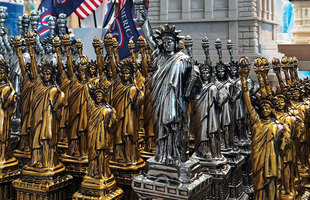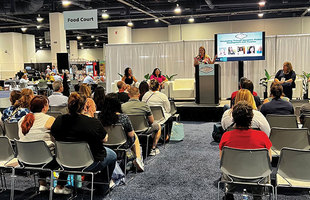Going “green” and being mindful of the planet’s resources is spilling into the way people shop for others and choose souvenirs from the places they visit. A growing number of visitors want to know their souvenirs were thoughtfully provided; and they’re paying close attention to how they’re sourced, how they’re made and how they’re packaged.
For this reason, Ali Mulaga, owner of Green & Bean Boutique in Annapolis, Maryland, has created an entire gift shop dedicated to brands that focus on conservation and ethically sourcing materials. She estimates her 1,200-square-foot shop is home to more than 40 brands, all known for their eco-consciousness.
Mulaga is sure to feature profiles of all the brands she carries on the store’s website to detail their commitment to a greener way of life. She also calls out the causes they hold near and dear to their hearts, shows how they are giving back and highlights their global impact.
For instance, nonprofits like Anchal use female designers in India to create one-of-a-kind quilts, pillows, apparel, home accessories and travel bags using 100% recycled vintage-cotton saris, certified organic cotton and low-impact and natural plant dyes, according to the website. In return, the women are paid fair wages and given education and health services.
Another example, TBCo., has spared 800,000 garments from being sent to landfills only to be turned into scarves, blankets, pajamas and other wearables and home accents, according to the company’s website. And it donates 2% of every purchase to charities that protect the planet.
“People really like seeing things made with recycled materials because I think we’re all really concerned about trash,” Mulaga shares.
Material matters
Product manufacturers are taking note of this trend, paying more attention to the materials that go into products as well as the causes they support with their corporate dollars.
Connor Atkins, marketing representative for The RGU Group in Winston-Salem, North Carolina, explains the company known for selling plush souvenirs has always been interested in creating a “robust, eco-friendly product.”
The wholesaler took a step forward in 2023 when it introduced its line of 100% recycled Graffiti Teddies, each one made from 15 half-liter plastic bottles, Atkins notes.
“The entire RGU team believes in the importance of environmental stewardship, and this is one very crucial step forward for us,” he says.
He adds that the 10-inch teddy bears are “100% GRS (Global Recycled Standard) certified, meaning that every component, along the entire downstream supply chain, is recycled.”
Another company quite literally taking steps to ensure the health of the planet is Conscious Step, which sells socks, sweatshirts and candles made of materials that are kind to the Earth.
Additionally, the team works with “17 nonprofit partners fighting for some of the world’s most important conservation causes, like saving endangered species, protecting rainforests and restoring oceans,” says Madeleine Green, the company’s marketing and advertising manager.
To date, Conscious Step has donated more than $1.1 million to charity partners since its inception with $1 per sock, $1 per candle and $5 per sweatshirt donated to its respective cause for every item sold, Green notes.
For this reason, the company’s socks are made with Global Organic Textile Standard (GOTS) organic, vegan-certified, and fair trade-certified cotton and recycled polyester. Additionally, their sweatshirts are made with 100% organic cotton while candles are handmade with locally harvested beeswax, coconut oil, and phthalate-free fragrance, Green says.
Causes in your own backyard
But supporting causes doesn’t necessarily mean across the globe. With more than 2 million acres of public land, the Pennsylvania Wilds has a lot of ground to cover in maintaining “some of the most spectacular wild lands east of the Mississippi,” according to the website.
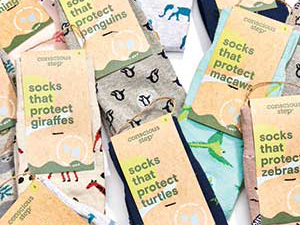
Conscious Step socks are made with vegan-certified and fair-trade certified cotton and recycled polyester.
For this reason, 90% of the products online and in the physical gift shops are from artisans and businesses located in the region; this not only creates economic opportunities, but reduces the environmental footprint by avoiding shipping from faraway places, says Libby Bloomquist, the sustainable commerce director for the PA Wilds Center for Entrepreneurship.
Additionally, shoppers can support stewardship of the region’s public lands through a Charity Checkout for Conservation campaign, Bloomquist notes. Funds donated to this campaign are given to the Pennsylvania Parks and Forests Foundation and are earmarked for reinvestment back into stewardship and maintenance projects on public lands in the Pennsylvania Wilds, including the region’s 29 state parks and eight state forests, she explains.
And when it comes to the types of products that are sold, not just any old trinket or household item will do.
Bloomquist says the merchandise is carefully selected for its dedication to minimally impacting the environment.
“A variety of stewardship-minded and eco-friendly products are sold at PA Wilds Conservation Shops, including items made with sustainable materials, such as recycled cardboard earrings and plants grown in local gardens,” she notes. “Because people are looking for natural alternatives, personal-care products made with good-for-you ingredients are very popular.”
An eye on packaging
But it’s not just what the product’s made of that matters, their packaging also has an impact.
Mulaga notes packing — and even gift wrapping — are being scrutinized for having a negative impact on natural resources.
“People are loving recycled materials, like good packaging,” she notes. “And people love it when they see our tissue paper that has stickers that say ‘I’m compostable.’”
The RGU Group is one company that is mindful of the boxes it uses to ship merchandise in and ensures they are made from 100% pre- and post-consumer waste, Atkins says.
At Conscious Step, the name of the game is minimal (and recyclable) paper packaging, according to Green.
Ultimately, when it comes to products that pack a conservation punch, Mulaga says the product must still hold its own and be good enough to stand on its own merit.
“The recycled materials, the eco-conscious messaging, the ethical sourcing, I feel like that’s like a massive cherry on top, but it usually is the product first that catches the eye,” she notes.
Whether a beauty product or a teddy bear, a statue or a Christmas ornament, choose the souvenirs you carry wisely. Because the public is watching — not just what goes on your shelves, but what goes into your trash.


